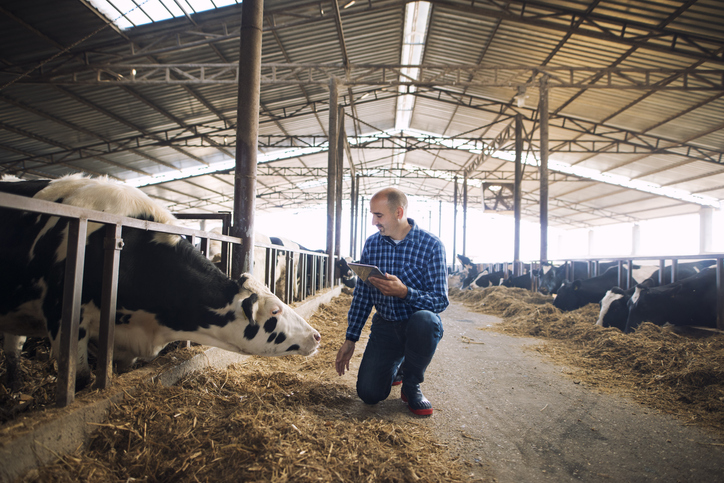-
Why Tax Planning for Farmers is Essential
- Aug 30, 2023
- By Genske, Mulder & Company
- In Uncategorized
- Comments Off on Why Tax Planning for Farmers is Essential
In the world of dairy farming, life revolves around the care of livestock, the cultivation of land, and the production of wholesome products. Farmers combat the variably changing milk and commodity markets to maintain profitability and a significant piece impacting a dairy farmer’s bottom line: tax planning. While cows graze and fields flourish, the savvy dairy farmer understands that proactive tax planning is essential for financial sustainability and growth. In this blog post, we delve into the reasons why tax planning holds a crucial place in the life of a dairy farmer.
1. Preserving Profitability
Tax planning isn’t just about reducing the tax bill but optimizing profits. By strategically managing deductions, credits, and expenses, dairy farmers can effectively lower their taxable income and retain a greater portion of their hard-earned revenue. This extra capital can be reinvested into the farm’s operations, enabling expansion, equipment upgrades, or herd improvements.
2. Navigating Agricultural Tax Complexities
The world of agriculture is filled with unique tax regulations and incentives that not all professionals may be familiar with. Dairy farmers face a complex web of deductions, exemptions, and credits tailored to their industry. Effective tax planning involves understanding these nuances and aligning financial strategies with them to maximize benefits.
3. Managing Cash Flow
Dairy farming often involves seasonal fluctuations in income and expenses. Proper tax planning can help even out cash flow by deferring income to lower-tax years or prepaying expenses to reduce taxable income in high-earning years. This approach can provide stability and improve the farm’s financial resilience.
4. Utilizing Deductions and Credits
Dairy farmers have access to a range of deductions and credits related to equipment purchases, animal care, conservation efforts, and more. By staying informed about these opportunities, farmers can take full advantage of them to reduce their tax liability and increase their overall financial efficiency.
5. Minimizing Surprises and Penalties
Failing to plan effectively can lead to unpleasant surprises during tax season. Unexpected tax bills or penalties can strain a dairy farmer’s financial resources. By engaging in year-round tax planning, farmers can accurately estimate their tax liability and make timely payments, avoiding costly penalties and ensuring compliance with tax regulations.
6. Family and Succession Planning
Many dairy farms are family-owned and operated. Proper tax planning can help facilitate smooth transitions of ownership from one generation to the next. Implementing strategies like gifting assets, utilizing family partnerships, and structuring estate plans can ensure the legacy of the farm while minimizing tax implications.
7. Investment in the Future
The dairy industry is evolving with advancements in technology and sustainable practices. Tax planning can facilitate the adoption of these innovations by providing tax incentives for investing in energy-efficient equipment, sustainable practices, and research and development.
In the world of dairy farming, where the connection to the land and animals runs deep, tax planning might seem like a distant concern. However, it is an integral part of securing the farm’s financial health and prosperity. By embracing strategic tax planning, dairy farmers can not only ensure compliance with tax laws but also harness opportunities to reduce tax burdens, increase profitability, and pave the way for a thriving and sustainable future in the industry. As the cows graze and the milk flows, effective tax planning stands as a testament to the farmer’s commitment to the farm’s growth and success.
Fortunately, our team of farm accountants at Genske, Mulder & Company, LLP can provide valuable guidance and expertise to help farmers create a comprehensive tax plan, ensuring they maximize their income and take full advantage of all available tax planning tools. Contact us today to learn more.
-
Farm Bookkeeping 101: Seven Steps to Ensure Success
- Aug 30, 2023
- By Genske, Mulder & Company
- In Uncategorized
- Comments Off on Farm Bookkeeping 101: Seven Steps to Ensure Success
In today’s economic landscape, proper bookkeeping practices are essential for any business, and farming is no exception. Farm bookkeeping helps farmers keep track of their financial activities and provides valuable insights for making informed decisions. It ensures that all financial transactions are recorded accurately, forming the foundation for analysis and decision-making. Proper bookkeeping practices offer several benefits, including:
1. Financial Control: Maintaining organized financial records allows farmers to closely monitor their income and expenses closely, enabling better control over their finances.
2. Profitability Analysis: Through regular review and analysis of financial reports, farmers can identify profit margins, assess the performance of different ventures, and make adjustments accordingly.
3. Tax Compliance: Accurate and up-to-date financial records facilitate tax preparation and promote adherence to tax regulations.
4. Access to Financing: When seeking loans or grants, comprehensive financial records are crucial for demonstrating the financial viability and stability of the farm operation.Understanding Farm Bookkeeping
Farm bookkeeping involves systematically recording, organizing, and analyzing financial data related to agricultural activities. It provides insights into the farm’s financial health and offers a clear picture of the profitability and costs associated with specific aspects of the operation. Key components of farm bookkeeping include:
• Income Records: Tracking all sources of income, such as crop sales, livestock sales, government subsidies, and other revenue streams.
• Expense Records: Logging all farm-related expenses, including feed, seed, fertilizers, equipment, labor costs, maintenance, and utilities.
• Inventory Management: Maintaining accurate inventory records, including livestock, crops in storage, and other farm assets.
• Bank Statements: Regularly reconciling bank statements with bookkeeping records to ensure accuracy.Step 1: Establishing a System
The first step toward better farm bookkeeping is establishing a system that aligns with your farm’s unique needs. Consider the following factors:
• Design: Design a bookkeeping system that suits your farm’s size, complexity, and available resources. Choose a user-friendly and efficient method, whether it’s a manual ledger, spreadsheet, or specialized software.
• Software or Tools: Select the right software or tools for farm bookkeeping. Numerous options, such as accounting software tailored for the agricultural sector, can simplify record-keeping and streamline financial management.Step 2: Organizing Financial Documents
Gathering and organizing all relevant financial documents is crucial to ensure efficient bookkeeping. This includes invoices, receipts, bank statements, loan documents, and other financial paperwork. Create a system, whether physical folders or software categories, to easily store and access these documents.
Step 3: Tracking Income and Expenses
Accurate tracking of income and expenses is the backbone of farm bookkeeping. Record all sources of income, including sales from crops, livestock, or other products, as well as any government subsidies or grants. Simultaneously, diligently monitor and log all farm-related expenses, such as feed, equipment purchases, fuel, maintenance, repairs, and labor costs.
Step 4: Maintaining Accurate Inventory Records
Managing inventory is a critical aspect of efficient farm bookkeeping. Properly tracking inventory helps identify the availability and value of assets, facilitates tax valuation, and enables effective decision-making. Implement manual or digital systems to record and update inventory levels regularly.
Step 5: Reconciling Bank Statements
To ensure the accuracy of your financial records, regularly reconcile your farm’s bank statements with your bookkeeping. This process involves comparing transactions from your bookkeeping system with bank statements, detecting discrepancies, and promptly addressing them. By doing so, you can catch errors or fraudulent activities and maintain the integrity of your financial records.
Step 6: Analyzing Financial Data
Financial data analysis offers valuable insights into the profitability of your farm operation. Utilize financial reports generated from your bookkeeping system to evaluate performance, identify areas for improvement, and seek cost-saving opportunities. Regularly reviewing and analyzing these reports will help inform decision-making and drive farm profitability.
Step 7: Budgeting and Financial Planning
Utilize historical farm bookkeeping data to develop a realistic budget for the upcoming year. A well-planned budget considers projected income, upcoming expenses, and investment needs. This exercise enables farmers to estimate cash flow, allocate resources effectively, and make informed financial decisions.
When to Seek Help from an Accounting Professional
Engaging an accounting professional may become necessary at a certain point. As your operation grows or becomes more complex, professional assistance can provide expert financial advice, ensure compliance with tax regulations, and optimize your bookkeeping system. Don’t worry – as one of the top CPA firms in the country, at Genske, Mulder & Company, LLP, and we’re here to help. Contact us today to learn more.
-
Financial Planning for Farmers for Maximizing Profits
- Aug 30, 2023
- By Genske, Mulder & Company
- In Uncategorized
- Comments Off on Financial Planning for Farmers for Maximizing Profits
By incorporating effective financial planning strategies, farmers can mitigate risks, avoid costly mistakes, and make their farms as profitable as possible. This article will explore the importance of financial planning for farmers and how it can contribute to their long-term success.
Understanding Cash Flow
A crucial component of financial planning for farmers is gaining a thorough understanding of cash flow. Since farming often requires significant capital investments, it is essential to evaluate the financing options available and assess the profitability of these investments. While high yields are desirable, excessive spending on inputs can erode profitability. Engaging a knowledgeable financial advisor can provide valuable insights by identifying areas of wasteful spending and finding viable sources of capital to drive sustainable growth without accumulating excessive debt. Moreover, financial advisors can analyze current cash flows and collaboratively develop plans to enhance profitability.
Optimizing Tax Planning
Farm taxes introduce an additional layer of complexity beyond regular business taxes. Farmers are entitled to numerous tax exemptions, deductions, and rebates designed for their industry. While farmers may already have accountants to handle their tax returns, partnering with a financial advisor can offer substantial benefits. Financial advisors specializing in agriculture can assist farmers in planning for lower tax burdens in the long run. They can guide eligible expenses, taxable income, and strategies to qualify for tax breaks. Additionally, financial advisors can help farmers choose the most suitable business structure based on the size and needs of their farm. By undertaking comprehensive tax planning at the beginning of each year, farmers can position themselves for success come tax time.
Breakeven Analysis
Breakeven analysis is an essential component of financial planning for farmers, allowing them to calculate the minimum price they need to sell their products to cover fixed and variable costs. Through breakeven analysis, farmers can determine their level of profitability, identify inefficiencies and waste, and make informed decisions regarding crop choice, pricing, and marketing. A financial advisor can guide farmers through performing a breakeven analysis, outlining areas that need improvement, and offering recommendations to enhance profitability. With the insights from breakeven analysis, farmers can develop an informed business plan and cultivate a profitable and sustainable agricultural enterprise.
Benchmarking
Benchmarking allows farmers to compare their financial performance to industry standards and top performers, providing insight into areas for improvement and where the farm excels. Farmers can identify opportunities for cost savings and optimization by analyzing data trends, allowing them to allocate resources and increase profitability efficiently. A financial advisor can assist farmers in identifying relevant benchmarking indicators, comparing their performance to peers, and recommending improvement strategies. With the guidance of a financial advisor, farmers can leverage benchmarking to increase profits, reduce costs, and position their farms for long-term success.
Financial Forecasts
Financial forecasting involves predicting future financial performance, helping farmers evaluate different scenarios’ impacts, and making informed decisions about their operations. Farmers can project future costs, revenues, and profits by examining financial statements and industry trends. Accurate financial forecasts enhance decision-making, allowing farmers to develop business plans, prepare for seasonal fluctuations, address challenges promptly, and identify areas for growth. A financial advisor can assist farmers in developing robust financial forecasts, leveraging their industry expertise to provide valuable insights and recommendations to optimize financial performance. By engaging the services of a financial advisor, farmers can create realistic financial goals and implement strategies to achieve them efficiently.
Finding the Best Farm Financial Planning Experts
When it comes to financial planning for farmers, the expertise of a specialized financial advisor is invaluable. While any financial advisor can be helpful for individuals managing personal budgets, farmers require advisors with specific knowledge and experience in the agricultural sector. Farmers can access tailored guidance and solutions that cater to their unique financial needs and circumstances by seeking out an advisor well-versed in assisting farm owners. Genske, Mulder & Company, LLP experts have over 40 years of experience helping farmers grow and thrive. Reach out to us, share your requirements, and let us connect you with the expert support you deserve.
-
Farm Inheritance Tax: Protecting Your Farm’s Legacy
- Aug 30, 2023
- By Genske, Mulder & Company
- In Uncategorized
- Comments Off on Farm Inheritance Tax: Protecting Your Farm’s Legacy
As a farmer, you understand the value of hard work and the importance of preserving your legacy for future generations. One crucial aspect of estate planning for farmers is managing inheritance taxes. In this article, we will explore the concept of farm inheritance tax, its implications, and essential strategies to minimize the tax burden on your heirs.
Understanding Farm Inheritance Tax
As of 2023, the federal estate tax applies to estates with over $ 12.92 million in assets. If your farm’s assets exceed these limits, your heirs may be required to file a federal estate tax return and pay up to a 40% tax on the amount exceeding the limit. However, it is essential to note most family farms fall below these thresholds.
Additionally, some states also have estate taxes. Seventeen states impose either an estate or inheritance tax. Some of these state exemption levels are as low as $1 million; in some situations, no exemptions apply.
Ways to Reduce Farm Inheritance Tax
Although avoiding inheritance taxes for your farm may not be possible altogether, there are strategies to minimize the tax burden. Here are a few effective methods:
1. Gifting Land and Assets: By giving gifts to your relatives, you can effectively reduce the value of your estate. As of the 2022 tax year, the maximum amount you can give to someone without it counting against your lifetime exclusion amount is $16,000. Gifting land within this limit to others can also help minimize tax implications.
2. Establishing Trusts: Properly structured irrevocable or bypass trusts provide legal protection for your farm assets. Trusts can offer flexibility and control over how your assets are distributed while helping to reduce inheritance taxes.
3. Strategic Spending: If your farm’s assets may surpass the federal or state exemption limits, consider spending surplus wealth now. By enjoying your extra wealth during your lifetime, you can reduce the value of your estate and minimize inheritance taxes for your heirs.
Importance of Farm Succession Planning
Creating a comprehensive farm succession plan is crucial to ensuring the smooth transition of your farm or ranch to the next generation. In addition to addressing legal and financial complexities, a well-designed succession plan can help your heirs minimize inheritance taxes.
Starting your Farm Estate Planning Journey
Navigating farm inheritance tax and estate planning can be overwhelming. Fortunately, you don’t have to do it alone. Begin by building a team of professionals who can guide you through the succession process and help create a customized strategy to ensure the longevity of your farm.
Farm inheritance tax is a significant concern for farmers who want to preserve their hard-earned legacy. By understanding the implications of estate taxes, exploring tax reduction strategies, and implementing a robust succession plan, you can contribute to the long-term sustainability of your farm and ensure a smooth transfer of assets to the next generation.
Our team of professionals at Genske, Mulder & Company, LLP is here to help you safeguard your farm’s future and protect your family’s legacy. Contact us today to learn more.
Categories
Categories
- Uncategorized (24)
Iframe Video
Twitter Feed
- Our Twitter feed is currently unavailable but you can visit our official twitter page @ThemeForest.




